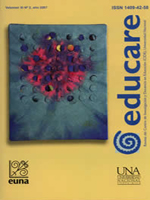Los conocimientos previos en la alfabetización inicial
DOI:
https://doi.org/10.15359/ree.11-2.9Keywords:
Previous knowledge, reading and writing, initial alphabetization, first yearAbstract
Initial alphabetization constitutes a challenge for educational systems due to its impact in the behavior of people in a literate society, as its importance for future learning of different disciplines. In this article, the role of previous knowledge is discussed for the consequent creation of significant learning areas in reading and writing. This discussion is based on the analysis of the information collected by a study on the construction processes of writing on first grade students.
References
Flores, L. E. y Sánchez, M. (2004). Alfabetización de niños, niñas y personas adultas: Componente indispensable en la formación docente. Lectura y Escritura en Voces Latinoamericanas.
Freire, P. y Macedo, D. (1989). Alfabetización: lectura de la palabra y lectura de la realidad. España: PAIDÓS.
Gómez, P. (1983). Propuesta para el aprendizaje de la lengua escrita. México: SEP-OEA.
Hachén, R. (2002). "Conocimiento lingüístico y reflexión metalingüística". Lectura y Vida, 23(2).
Sánchez, M., Flores, L. E. y Céspedes, E. (2001). Alfabetización: transitando entre el contexto social y el texto escrito. Costa Rica: OIM, MEP, USAID, UNA.
Published
How to Cite
Issue
Section
License
1. In case the submitted paper is accepted for publication, the author(s) FREELY, COSTLESS, EXCLUSIVELY AND FOR AN INDEFINITE TERM transfer copyrights and patrimonial rights to Universidad Nacional (UNA, Costa Rica). For more details check the Originality Statement and Copyright Transfer Agreement
2. REUTILIZATION RIGHTS: UNA authorizes authors to use, for any purpose (among them selfarchiving or autoarchiving) and to publish in the Internet in any electronic site, the paper´'s final version, both approved and published (post print), as long as it is done with a non commercial purpose, does not generate derivates without previous consentment and recognizes both publisher's name and authorship.
3. The submission and possible publication of the paper in the Educare Electronic Journal is ruled by the Journal’s editorial policies, the institutional rules of Universidad Nacional and the laws of the Republic of Costa Rica. Additionally, any possible difference of opinion or future dispute shall be settled in accordance with the mechanisms of Alternative Dispute Resolution and the Costa Rican Jurisdiction.
4. In all cases, it is understood that the opinions issued are those of the authors and do not necessarily reflect the position and opinion of Educare, CIDE or Universidad Nacional, Costa Rica. It is also understood that, in the exercise of academic freedom, the authors have carried out a rogorous scientific-academic process of research, reflection and argumentation thar lays within the thematic scope of interest of the Journal.
5. The papers published by Educare Electronic Journal use a Creative Commons License:














 The articles published by Educare Electronic Journal can be shared with a Creative Commons License:
The articles published by Educare Electronic Journal can be shared with a Creative Commons License: 



